Organic Food Production
Organic Food Production: A Sustainable Approach to Agriculture
Organic food production is an agricultural method that emphasizes the use of natural substances and processes to cultivate crops and raise livestock. This approach contrasts with conventional farming, which often relies on synthetic chemicals and genetically modified organisms (GMOs). Organic farming prioritizes environmental health, biodiversity, and the well-being of farm workers and animals.
Core Principles of Organic Farming
Organic farming is grounded in several key principles:
-
Soil Fertility and Health: Organic farmers enhance soil health through practices like composting, crop rotation, and the use of organic fertilizers Organic Food Production. These methods improve soil structure, increase microbial activity, and reduce erosion.
-
Biodiversity: By avoiding synthetic pesticides and fertilizers, organic farming supports a diverse ecosystem Organic Food Production. This biodiversity helps in pest control and pollination, leading to more resilient agricultural systems.
-
Animal Welfare: Organic standards require that animals have access to the outdoors, are fed organic feed, and are not treated with antibiotics or synthetic hormones. This ensures humane treatment and healthier livestock.
-
Avoidance of Synthetic Chemicals: Organic farming prohibits the use of synthetic pesticides, herbicides, and fertilizers, reducing chemical runoff into water systems and promoting a healthier environment.

Environmental Benefits
Organic farming offers several environmental advantages:
-
Reduced Chemical Use: By eliminating synthetic chemicals, organic farming minimizes pollution and chemical runoff, leading to cleaner water and soil.
-
Carbon Sequestration: Organic practices like reduced tillage and the use of cover crops can increase soil organic carbon levels, helping to mitigate climate change.
-
Enhanced Biodiversity: Organic farms typically host a wider variety of plants, insects, and animals, contributing to a more balanced ecosystem.
Health Benefits
Consuming organic foods may offer health benefits:
-
Lower Pesticide Exposure: Organic foods generally have lower levels of pesticide residues, reducing the risk of exposure to harmful chemicals.
-
Nutrient-Rich Produce: Some studies suggest that organic produce may contain higher levels of certain nutrients, including antioxidants and essential fatty acids.
-
Antibiotic Resistance: By avoiding the use of antibiotics in livestock, organic farming reduces the risk of developing antibiotic-resistant bacteria.
Economic Aspects
While organic products often come with a higher price tag, they can be more profitable for farmers due to premium pricing and growing consumer demand Organic Food Production . The organic market has seen significant growth, with increasing interest from consumers seeking healthier and more sustainable food options.https://ecolifewise.com/the-sustainability-of-organic-food-production/
Challenges in Organic Farming
Despite its benefits, organic farming faces challenges:
-
Lower Yields: Organic farms may produce lower yields compared to conventional farms, which can be a concern for food security.
-
Certification Costs: Obtaining organic certification can be costly and time-consuming for farmers.
-
Market Access: Organic products may have limited availability in certain regions, making them less accessible to all consumers.

Organic Farming in India
In India, organic farming is gaining traction as a sustainable alternative to conventional agriculture. The “India Organic” certification mark, managed by the Agricultural and Processed Food Products Export Development Authority (APEDA), ensures that products meet national organic standards.
Farmers in states like Andhra Pradesh have adopted natural farming methods, utilizing organic inputs such as cow dung and urine, along with practices like mulching and crop rotation. These methods have shown resilience against extreme weather conditions, highlighting the potential of organic farming in adapting to climate change. https://discovershpere.in/


No Responses